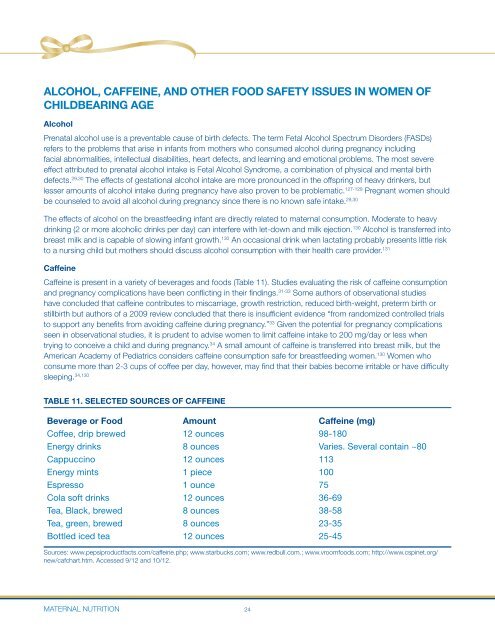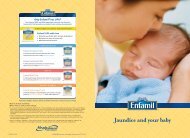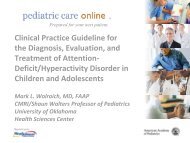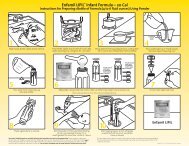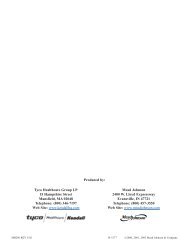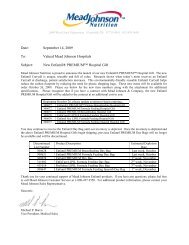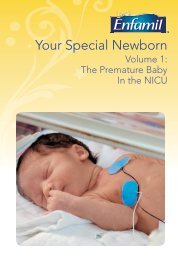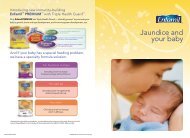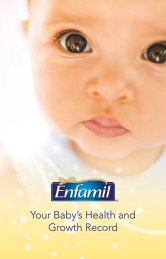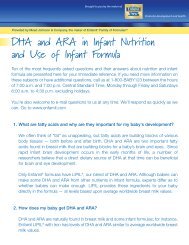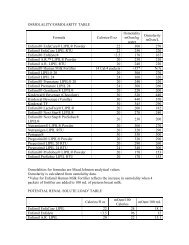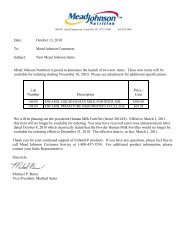LB2882MaternalNutriti+ - Mead Johnson Nutrition
LB2882MaternalNutriti+ - Mead Johnson Nutrition
LB2882MaternalNutriti+ - Mead Johnson Nutrition
Create successful ePaper yourself
Turn your PDF publications into a flip-book with our unique Google optimized e-Paper software.
ALCOHOL, CAFFEINE, AND OTHER FOOD SAFETY ISSUES IN WOMEN OF<br />
CHILDbEARING AGE<br />
Alcohol<br />
Prenatal alcohol use is a preventable cause of birth defects. The term Fetal Alcohol Spectrum Disorders (FASDs)<br />
refers to the problems that arise in infants from mothers who consumed alcohol during pregnancy including<br />
facial abnormalities, intellectual disabilities, heart defects, and learning and emotional problems. The most severe<br />
effect attributed to prenatal alcohol intake is Fetal Alcohol Syndrome, a combination of physical and mental birth<br />
defects. 29,30 The effects of gestational alcohol intake are more pronounced in the offspring of heavy drinkers, but<br />
lesser amounts of alcohol intake during pregnancy have also proven to be problematic. 127-129 Pregnant women should<br />
be counseled to avoid all alcohol during pregnancy since there is no known safe intake. 29,30<br />
The effects of alcohol on the breastfeeding infant are directly related to maternal consumption. Moderate to heavy<br />
drinking (2 or more alcoholic drinks per day) can interfere with let-down and milk ejection. 130 Alcohol is transferred into<br />
breast milk and is capable of slowing infant growth. 130 An occasional drink when lactating probably presents little risk<br />
to a nursing child but mothers should discuss alcohol consumption with their health care provider. 131<br />
Caffeine<br />
Caffeine is present in a variety of beverages and foods (Table 11). Studies evaluating the risk of caffeine consumption<br />
and pregnancy complications have been confl icting in their fi ndings. 31-33 Some authors of observational studies<br />
have concluded that caffeine contributes to miscarriage, growth restriction, reduced birth-weight, preterm birth or<br />
stillbirth but authors of a 2009 review concluded that there is insuffi cient evidence “from randomized controlled trials<br />
to support any benefi ts from avoiding caffeine during pregnancy.” 33 Given the potential for pregnancy complications<br />
seen in observational studies, it is prudent to advise women to limit caffeine intake to 200 mg/day or less when<br />
trying to conceive a child and during pregnancy. 34 A small amount of caffeine is transferred into breast milk, but the<br />
American Academy of Pediatrics considers caffeine consumption safe for breastfeeding women. 130 Women who<br />
consume more than 2-3 cups of coffee per day, however, may fi nd that their babies become irritable or have diffi culty<br />
sleeping. 34,130<br />
TAbLE 11. SELECTED SOURCES OF CAFFEINE<br />
beverage or Food Amount Caffeine (mg)<br />
Coffee, drip brewed 12 ounces 98-180<br />
Energy drinks 8 ounces Varies. Several contain ~80<br />
Cappuccino 12 ounces 113<br />
Energy mints 1 piece 100<br />
Espresso 1 ounce 75<br />
Cola soft drinks 12 ounces 36-69<br />
Tea, Black, brewed 8 ounces 38-58<br />
Tea, green, brewed 8 ounces 23-35<br />
Bottled iced tea 12 ounces 25-45<br />
Sources: www.pepsiproductfacts.com/caffeine.php; www.starbucks.com; www.redbull.com.; www.vroomfoods.com; http://www.cspinet.org/<br />
new/cafchart.htm. Accessed 9/12 and 10/12.<br />
MATERNAL NUTRITION 24


